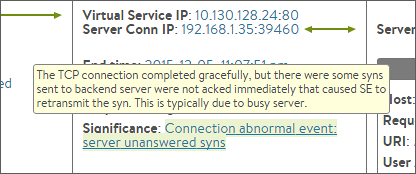This topic discusses Significant Log events types and the possible scenarios that can trigger these events.
The Avi Load Balancer logs Significant log event types. The errors are recorded in the page when Significant Logs are enabled ( default setting). A log can contain one or more events.
Errors that trigger significant events can be adjusted within the Analytics profile attached to the virtual service. For example, HTTP 4xx response codes or server RST packets might be omitted from being recorded as an error. The profile is also used to define a slow connection from a client or server.

Connection Setup Failed
The connection setup was ended prematurely by the client, which sent an RST during the TCP three-way handshake.
The connection setup was refused by the server, which sent an RST during the TCP three-way handshake.
TCP three-way handshake with the client timed out despite multiple retries.
TCP three-way handshake with the server timed out despite multiple retries.
The Avi Load Balancer was unable to complete the TCP three-way handshake with the client due to an internal error. This might be due to a lack of memory or other resources.
The Avi Load Balancer was unable to complete the TCP three way handshake with the server due to an internal error. This might be due to a lack of memory or other resources.
Connection Closed Abnormally
The client abnormally terminated the connection by sending a TCP RST.
The server abnormally terminated the connection by sending a TCP RST.
The established TCP connection with the client was closed due to a timeout. Despite multiple retry attempts, the client stopped responding to packets from the Avi Load Balancer.
The established TCP connection with the server was closed due to timeout. Despite multiple retry attempts, the server stopped responding to packets from Avi Load Balancer.
The connection was deleted due to an Avi Load Balancer configuration update.
The connection timed out waiting for the client to send an HTTP request.
The connection was prematurely closed by the client.
The connection dropped due to SSL handshake failure.
The connection was closed due to an internal error.
The established TCP connection was closed due to the triggering of the TCP profile’s idle timeout.
The connection was dropped due to server-side SSL handshake failure.
Validation of the server’s x509 certificate failed.
Connection Abnormal Event
Though the TCP connection established successfully, more packets were re-transmitted due to timeouts from the Avi Load Balancer. client. This might be due to a lossy network or a slow client.
Though the TCP connection established successfully, more packets were re-transmitted due to timeouts from the Avi Load Balancer server. This might be due to a lossy network or a slow server.
Though the TCP connection completed gracefully, there were instances when the TCP window advertised by the client depleted to zero. This means that the Avi Load Balancer could not send any more packets until the client opened the TCP window. This is usually due to a slow client.
Though the TCP connection completed gracefully, there were instances when the TCP window advertised by the server depleted to zero. This means that the Avi Load Balancer could not send any more packets until the server opened the TCP window. This is usually due to a slow server.
The TCP round trip time between the Avi Load Balancer and the client is greater than 1 second.
The TCP round trip time between the Avi Load Balancer and the server is greater than 500ms.
Though the TCP connection completed gracefully, more number of packets were re- transmitted from the Avi Load Balancer to the client. This might be due to a lossy or congested network.
Though the TCP connection completed gracefully, more number of packets were re-transmitted from the Avi Load Balancer to the server. This might be due to a lossy or congested network.
Though the TCP connection completed gracefully, the Avi Load Balancer received a high number of out-of-order packets from the client. This is generally due to lossy or congested network or drops by the Avi Load Balancer.
Though the TCP connection completed gracefully, the Avi Load Balancer received a high number of out-of-order packets from the client. This is generally due to lossy or congested network or drops by Avi Load Balancer.
Connection Setup Failed
The connection was dropped due to bad packets received from client during TCP three-way handshake.
Request Ended Abnormally
A 4xx client error HTTP response code was sent to the client.
A 5xx server error HTTP response code was sent to the client.
Client sent request with HTTP Protocol version 0.9.
The connection attempt was reset due to non-availability of servers. This might be because the server connection limit was reached, or all servers were in a down state.
Request Abnormal Event
The response time was greater than the configured threshold.
Server response time was greater than the configured threshold.
The server to which this connection was persisted, is no longer a valid destination.
Rule Failed to Execute
The Avi Load Balancer Policy or DataScript failed to execute. For DataScript failures, the expanded log might have a View All Headers button, which brings up a modal containing the DataScript error and a stacktrace.